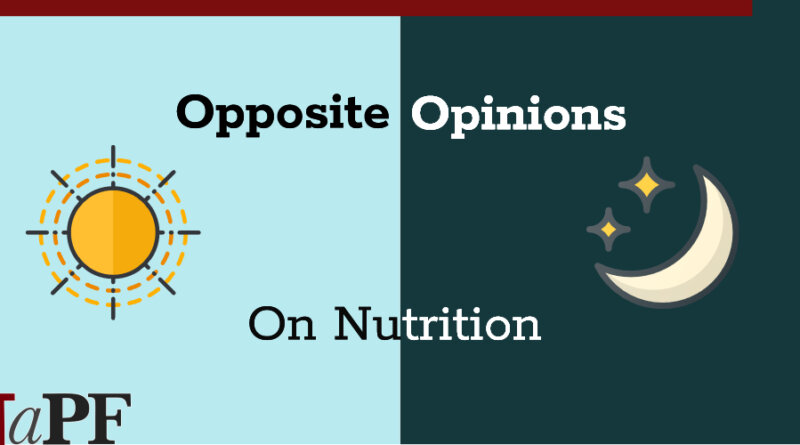Two Different Perspectives – Human and Pet Nutrition – Truth about Pet Food
USA Today recently posted a story titled “What is a balanced diet?” The story was regarding human nutrition (not pet nutrition), but the experts explaining what a balanced diet is in human nutrition turns out to be dramatically different from what a balanced diet is in pet nutrition.
Alice Lichtenstein, DSc, director of the Cardiovascular Nutrition Team at the Jean Mayer USDA Human Nutrition Research Center on Aging at Tufts University stated (bold added):
“a balanced diet should not require supplements. That is, of course, unless one has nutrient deficiencies and supplementation has been advised by a physician. Additional vitamin and mineral supplementation might also be desired for other benefits, but usually shouldn’t replace the natural source of the nutrient.”
To the contrary, the veterinary school at Tufts University has an opposite perspective for pet food (bold added):
“While a ‘whole foods’ approach where every nutrient comes from food, not supplements is appealing, it is nearly impossible to meet all of a pet’s nutrient needs without adding concentrated supplements.”
Question: Why do the pet nutritionists at Tufts University believe pets need “concentrated supplements” while the human nutritionists at Tufts believe a balanced diet should come from “the natural source of the nutrient“?
The answer could be the ultra-processed nature of many commercial pet foods and their support of veterinary institutions including the Tufts Veterinary School.
Ultra-processed.
The human nutritionists at Tufts also stated “The easiest way to work towards achieving a balanced diet is to limit intake of ultra-processed food…” Per the NOVA system (a food classification system) “with its identification and definition of ultra-processed foods that has been most applied in scientific literature” – ultra processed foods are:
“It starts with the fractioning of whole foods into substances including sugars, oils and fats, proteins, starches and fibre. These substances are often obtained from a few high-yield plant foods (such as corn, wheat, soya, cane or beet) and from puréeing or grinding animal carcasses, usually from intensive livestock farming.”
“Some of these substances are then submitted to hydrolysis, or hydrogenation, or other chemical modifications. Subsequent processes involve the assembly of unmodified and modified food substances with little if any whole food using industrial techniques such as extrusion, moulding and pre-frying. Colours, flavours, emulsifiers and other additives are frequently added to make the final product palatable or hyper-palatable.”
Most kibble pet foods and many canned pet foods include rendered ingredients (ground animal carcasses usually from intensive livestock farming) which are markers of ultra-processed food. As well, most kibble pet foods are extruded and include dyes and flavor additives, more markers of ultra-processed food.
Financial Support from the manufacturers of ultra-processed foods.
Tufts Veterinary School provides the following disclosures (pet food related only):
“Dr. Freeman has received research or residency funding from, given sponsored lectures for, or provided professional services for Hill’s Pet Nutrition, Nestle Purina PetCare, P&G Petcare (now Mars), and Royal Canin.”
“Dr. Heinze has provided professional services, has done consulting for WellPet, given sponsored talks for Nestle Purina Petcare and the Pet Food Institute.”
“Dr. Linder has received speaker fees or research funding from Hill’s Pet Nutrition, Nestle Purina Petcare, Royal Canin.”
Unfortunately, it is not just Tufts University pet food nutritionists that are financially involved with ultra-processed pet food manufacturers. Most (if not all) veterinary institutions accept funding from Hill’s, Purina, and Mars.
Balanced through natural sources of nutrients.
It is significantly important to provide your pet with a complete and balanced diet. Nutritional deficiencies or excesses will cause health consequences in your pet. Just a few from PetMD.com:
“Vitamin A: Deficiencies can cause decreased eating or anorexia, stunted growth, dull hair coat, and weakness. Toxicities can cause stunted growth, anorexia, and bone fractures.”
“Vitamin D: Deficiencies can cause rickets, enlarged joints, osteoporosis, and other bone issues. Toxicities can include hypercalcemia, decreased eating or anorexia, and lameness.”
However, your pet does NOT require a long list of supplements to achieve a complete and balanced diet. In the same way Tufts University human food nutritionists recommend, there are many pet food options available that balance the diet through ‘natural sources’ (food ingredients, minimally processed) or balance the diet through very minimal supplements.
Read the ingredient list on your pet’s food and just like what the Tufts University human food nutritionists told us – limit the intake of ultra-processed foods your pet consumes.
Wishing you and your pet(s) the best,
Susan Thixton
Pet Food Safety Advocate
Author Buyer Beware, Co-Author Dinner PAWsible
TruthaboutPetFood.com
Association for Truth in Pet Food

Become a member of our pet food consumer Association. Association for Truth in Pet Food is a a stakeholder organization representing the voice of pet food consumers at AAFCO and with FDA. Your membership helps representatives attend meetings and voice consumer concerns with regulatory authorities. Click Here to learn more.
What’s in Your Pet’s Food?
Is your dog or cat eating risk ingredients? Chinese imports? Petsumer Report tells the ‘rest of the story’ on over 5,000 cat foods, dog foods, and pet treats. 30 Day Satisfaction Guarantee. Click Here to preview Petsumer Report. www.PetsumerReport.com
Find Healthy Pet Foods in Your Area Click Here

The 2023 List
Susan’s List of trusted pet foods. Click Here to learn more.




